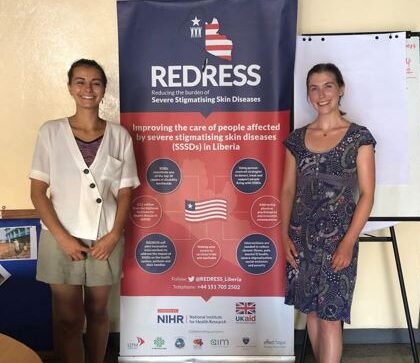By Maisy Lopez- Pigott and Rachel Johnstone
Last summer as part of our Masters in International Public Health at Liverpool School of Tropical Medicine, we (Maisy and Rachel) had the privilege of working with REDRESS to undertake our dissertation research projects. In this blog we share our reflections on this experience and introduce the research projects.
We were lucky enough to be able to travel to Liberia to undertake our data collection in June 2022. We spent a month in Liberia, travelling to Monrovia, Lofa county and Margibi county. We had a great time working with the REDRESS team, particularly country programme manager Zeela, and co-researchers Satta and Chris, and could not have completed the research without their support, as well as our fantastic supervisors. It was also useful to understand the value of implementation research, in that findings are applied in real-world situations throughout the research process. We benefitted from the experience of our co-researchers and their understanding of Liberian culture, which enabled us to do our interviews and focus groups.

The REDRESS team were very supportive and we learned so much through working with them and applying their feedback to improve our work, which was particularly valuable as this was our first time to conduct primary research. Knowledge gained from our research methods module during the Masters was helpful too, especially during the planning and write-up.
Maisy’s project explored the value of community engagement within REDRESS, by firstly reviewing standards of community engagement in research and then seeking to understand these within REDRESS. This was done through a literature review, in-depth interviews with various communities and secondary data analysis of reflexive diaries from peer researchers. The study showed that REDRESS community engagement activities aligned with UNICEF standards, leading to value creation, local capacity building and transformative effects in trust and health seeking behaviours. Additional strengths of engagements within REDRESS were the use of peer-researchers and communities taking part in project monitoring. Researchers within communities benefited the project but also came with ethical consideration which should be acknowledged and addressed. Opportunities of to strengthen the engagement within REDRESS were found in capacity budling, clearer communication and addressing power imbalances. You can read more about the findings from this study here.
Rachel’s project explored wellbeing among persons affected by skin NTDs in Liberia and their communities, in order to help develop the REDRESS psychosocial support programme. This was through body-mapping, a creative participatory research method, and focus group discussions. The findings showed that there is a significant psychosocial burden on persons affected by skin NTDs and that stigma, access to care, financial difficulties and uncertainty contribute to this. Key recommendations were to prioritise stigma reduction strategies, psychosocial support, financial support and improved medical care. You can read more about the findings from this study here.
A highlight for us was being immersed in Liberian culture which helped us to better understand the Liberian context and the impact of skin NTDs in Liberia. For instance, seeing the strong community spirit that exists led us to realise the huge impact of stigma and rejection on those affected by skin NTDs. We also saw the importance of strengthening systems and building local capacity in order for programmes such as REDRESS to be effective. It was so powerful to hear the personal stories and experiences of those affected and how REDRESS is engaging people across the country to address the burden of skin NTDs. We also loved the Liberian food and music!
Our research has contributed to the ongoing implementation research by REDRESS, which we hope will benefit people affected by skin NTDs in Liberia and elsewhere in future. We had a great time studying at LSTM and working with REDRESS, and we want to encourage future Masters students to get involved and take every opportunity you can!